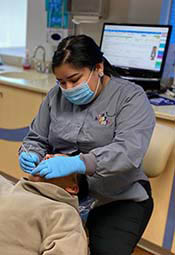You have probably been hearing about dental plaque for years now – from your dentist, and in every toothbrush and toothpaste commercial you’ve ever see. But do you really know what it is and why so many oral health experts seem to be so concerned about it? If not, read on. Once you understand what dental plaque can do to the long-term health of your teeth and gums, you’ll never neglect the problem again.
What Exactly is Dental Plaque?
The terms dental plaque and calculus often get used interchangeably, but they are not quite the same thing. Dental plaque – sometimes also called tooth plaque – is a soft deposit that forms on the surface of the teeth. The deposit is made up of different kinds of bacteria that accumulate through eating, digestion, and other things you do with your mouth.
Calculus is essentially calcified, hardened tooth plaque. You may have also heard your dentist call this tartar. Calculus comes from dental plaque, but it is a lot harder to get rid of, and a lot worse for your mouth. Typically the substance sticks firmly to your teeth and can only be removed by an oral health professional using specialized tools.
Why Should I Get Dental Plaque Treatment?
Dental plaque in small amounts is not a major cause for alarm. It is only when the amount begins to build up, and it hardens into calculus, that you should be concerned. In even modest amounts, plaque can lead to inflamed and infected gums. Mild cases are known as gingivitis and can lead to irritation, discomfort, and bad breath. More serious cases are called periodontitis, and if left untreated, they can cause your teeth to fall out. We don’t want to alarm you, but you need to take this threat seriously. The CDC estimates that as many as 47% of adult Americans suffer from periodontitis.
How Do I Get Rid of Dental Plaque?
The most dependable way to keep plaque from forming into calculus and to ward off the effects of gum disease is to practice regular, effective oral health.
- Brush your teeth twice a day, preferably after eating
- Floss your teeth daily
- Change your toothbrush every 3-4 months
- See a dentist twice a year for cleanings and checkups
Prevention is the Best Medicine
Develop good oral health habits at an early age, and you won’t have to worry about dental plaque causing your gums to become infected. Make sure you involve a dentist in the process, though. Their expertise can alert you if a more serious problem has developed, and recommend a strategy to treat the issue. Form a relationship with the team at MyOrthodontist, and know that your teeth are being well cared for.


